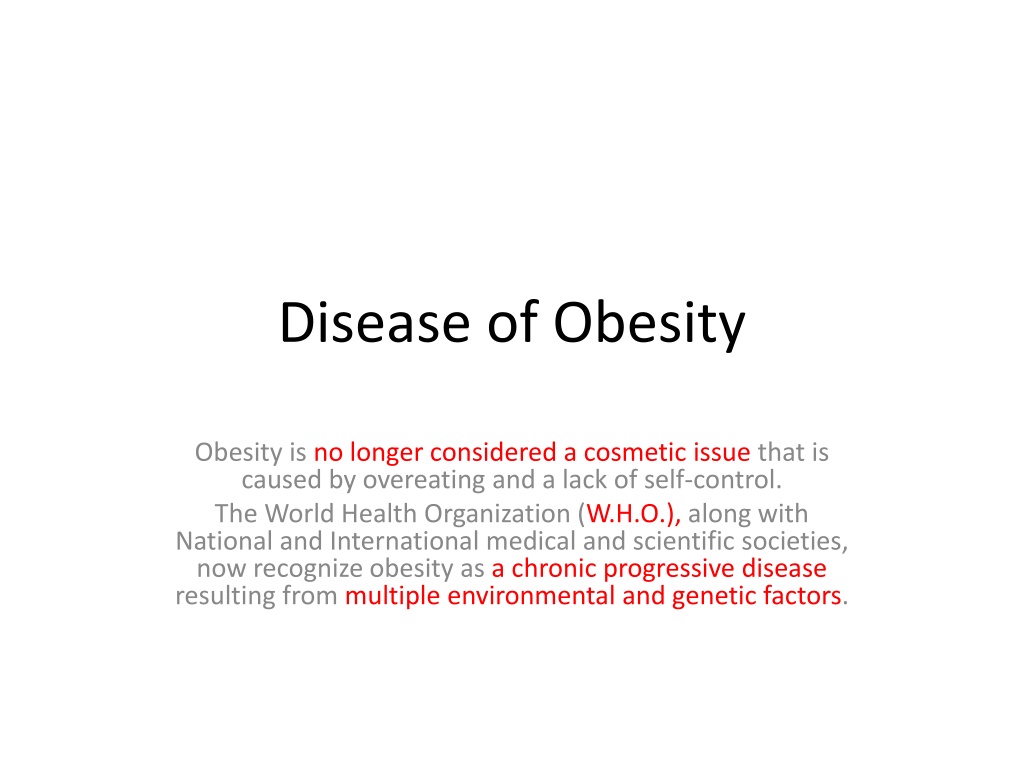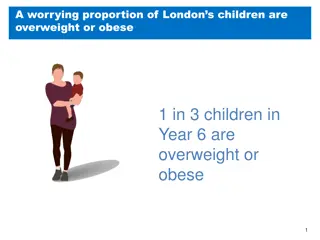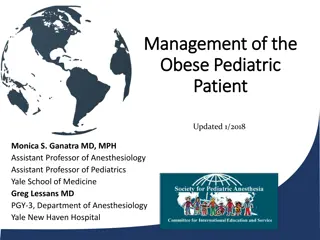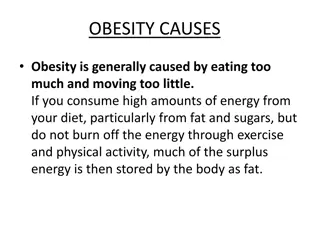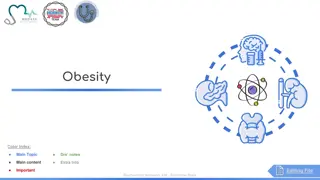Understanding the Disease of Obesity: A Multifactorial Condition
Obesity is no longer considered a cosmetic issue but recognized as a chronic progressive disease influenced by genetic, environmental, and behavioral factors. It requires lifelong treatment due to its costly impact on health and society. The condition is measured using Body Mass Index (BMI) categories and affects a significant portion of the global population. Obesity's progressive nature stems from a positive energy balance, hormonal changes, and weight gain that exacerbate fat accumulation, emphasizing the importance of addressing contributing factors to combat this prevalent health concern.
Uploaded on Oct 04, 2024 | 0 Views
Download Presentation

Please find below an Image/Link to download the presentation.
The content on the website is provided AS IS for your information and personal use only. It may not be sold, licensed, or shared on other websites without obtaining consent from the author. Download presentation by click this link. If you encounter any issues during the download, it is possible that the publisher has removed the file from their server.
E N D
Presentation Transcript
Disease of Obesity Obesity is no longer considered a cosmetic issue that is caused by overeating and a lack of self-control. The World Health Organization (W.H.O.), along with National and International medical and scientific societies, now recognize obesity as a chronic progressive disease resulting from multiple environmental and genetic factors.
Disease of Obesity The disease of obesity is extremely costly not only in terms of economics, but also in terms of individual and societal health, longevity, and psychological well-being. Due to its progressive nature, obesity requires life-long treatment and control.
Measuring Obesity Body Mass Index (BMI) Weight in kilograms divided by Height in meters squared (BMI = kg/m2) Category Normal Size Overweight Class I, Obesity Class II, Serious Obesity Class III, Severe Obesity BMI Range 18.9 to 24.9 25 to 29.9 30 to 34.9 35 to 39.9 40 and greater
Obesity Prevalence and Rate of Occurrence W.H.O., 65 % of the world s population lives in countries where overweight and obesity kills more people than underweight. Approximately 500 million adults in the world are affected by obesity and one billion are affected by overweight, along with 48 million children.
Progressive Nature of the Disease of Obesity Obesity is considered a multifactorial disease with a strong genetic component. Acting upon a genetic background are a number of hormonal, metabolic, psychological, cultural and behavioral factors that promote fat accumulation and weight gain.
Positive Energy Balance A positive energy balance may be caused by overeating or by not getting enough physical activity other conditions include: 1. 2. Chronic sleep loss Consumption of foods that, independent of caloric content, cause metabolic/hormonal changes that may increase body fat. These include foods high in sugar or high fructose corn syrup, processed grains, fat, and processed meats Low intake of fat-fighting foods such as fruits, vegetables, legumes, nuts, seeds, quality protein Stress and psychological distress) Many types of medications Various pollutants 3. 4. 5. 6.
Weight Gain , obesity begets obesity, which is one of the reasons the disease is considered progressive Weight gain causes a number of hormonal, metabolic and molecular changes in the body that increase the risk for even greater fat accumulation. This means that more of the calories consumed will be stored as fat. obesity affects certain regulators of appetite and hunger in a manner that can lead to an increase in meal size and the frequency of eating.
Obesity-related Conditions Obesity reduces mobility . psychological or emotional distress which, in turn, produces hormonal changes that may cause further weight gain by stimulating appetite and by increasing fat uptake into fat storage depots. Sleep duration is reduced by weight gain due to a number of conditions that impair sleep quality such as pain, sleep apnea and other breathing problems, a need to urinate more frequently, use of certain medications, and altered regulation of body temperature. Shortened sleep duration, in turn, produces certain hormones that both stimulate appetite and increase the uptake of fat into fat storage depots. other diseases such as hypertension, diabetes, heart disease, osteoarthritis and depression
Diets Dietary weight-loss causes biological responses :reduction in energy expenditure and increased drive to eat persist long-term, an individual will often not only regain all of their lost weight, but even more.
Treatment Options Non-Surgical Treatment Surgical Treatment(only modality that provides long term weight loss and weight loss maintenance)
The society supports the following procedures Roux-en-Y Gastric Bypass Duodenal Switch Intragastric Balloon Sleeve Gastrectomy Adjustable Gastric Banding Bariatric Reoperative Procedures Open procedures as deemed appropriate by the surgeon
The Roux-en-Y Gastric Bypass often called gastric bypass is considered the gold standard of weight loss surgery.
smaller and facilitates significantly smaller meals, some degree less absorption of calories and nutrients. Most importantly, the rerouting of the food stream produces changes in gut hormones that promote satiety, suppress hunger, and reverse one of the primary mechanisms by which obesity induces type 2 diabetes.
Advantages Produces significant long-term weight loss (60 to 80 percent excess weight loss) Restricts the amount of food that can be consumed May lead to conditions that increase energy expenditure Produces favorable changes in gut hormones that reduce appetite and enhance satiety Typical maintenance of >50% excess weight loss
Disadvantages Is technically a more complex operation than the AGB or LSG and potentially could result in greater complication rates Can lead to long-term vitamin/mineral deficiencies particularly deficits in vitamin B12, iron, calcium, and folate Generally has a longer hospital stay than the AGB Requires adherence to dietary recommendations, life-long vitamin/mineral supplementation, and follow- up compliance
Sleeve Gastrectomy The Laparoscopic Sleeve Gastrectomy is performed by removing approximately 80 % of the stomach.
The Procedure mechanisms. First, smaller volume The greater impact,effect the surgery has on gut hormones that impact a number of factors including hunger, satiety, and blood sugar control. sleeve is as effective as the roux-en-Y gastric bypass in terms of weight loss and improvement or remission of diabetes. The complication rates of the sleeve fall between those of the adjustable gastric band and the roux-en-y gastric bypass.
Advantages 1. Restricts the amount of food the stomach can hold Weight loss of >50% for 3-5+ year data, and weight loss comparable to that of the bypass with maintenance of >50% Requires no foreign objects (AGB), and no bypass or re-routing of the food stream (RYGB) Involves a relatively short hospital stay of approximately 2 days Causes favorable changes in gut hormones that suppress hunger, reduce appetite and improve satiety 2. 3. 4.
Disadvantages Is a non-reversible procedure Has the potential for long-term vitamin deficiencies Has a higher early complication rate than the AGB
Adjustable Gastric Band The Adjustable Gastric Band often called the band
The Procedure the smaller stomach pouch, eating just a small amount of food will satisfy hunger and promote the feeling of fullness. The feeling of fullness depends upon the size of the opening between the pouch and the remainder of the stomach created by the gastric band. The size of the stomach opening can be adjusted by filling the band with sterile saline, which is injected through a port placed under the skin. The clinical impact of the band seems to be that it reduces hunger, which helps the patients to decrease the amount of calories that are consumed.
Advantages 1. 2. 3. Reduces the amount of food Induces excess weight loss of approximately 40 50 % Involves no cutting of the stomach or rerouting of the intestines Requires a shorter hospital stay, usually less than 24 hours Is reversible and adjustable Has the lowest rate of early postoperative complications and mortality among the approved bariatric procedures Has the lowest risk for vitamin/mineral deficiencies 4. 5. 6. 7.
Disadvantages 1. 2. Slower and less early weight loss than other surgical procedures Greater percentage of patients failing to lose at least 50 percent of excess body weight compared to the other surgeries commonly performed Requires a foreign device to remain in the body Can result in possible band slippage or band erosion into the stomach in a small percentage of patients Can have mechanical problems with the band, tube or port in a small percentage of patients Can result in dilation of the esophagus if the patient overeats Requires strict adherence to the postoperative diet and to postoperative follow-up visits Highest rate of re-operation 3. 4. 5. 6. 7. 8.
Biliopancreatic Diversion with Duodenal Switch (BPD/DS) Gastric Bypass BPD/DS is a procedure with two components. First, a smaller, tubular stomach pouch is created by removing a portion of the stomach, very similar to the sleeve gastrectomy. Next, a large portion of the small intestine is bypassed
Advantages 1. Results in greater weight loss than RYGB, LSG, or AGB, i.e. 60 70% percent excess weight loss or greater, at 5 year follow up Allows patients to eventually eat near normal meals Reduces the absorption of fat by 70 percent or more Causes favorable changes in gut hormones to reduce appetite and improve satiety Is the most effective against diabetes compared to RYGB, LSG, and AGB 2. 3. 4. 5.
Disadvantages 1. Has higher complication rates and risk for mortality than the AGB, LSG, and RYGB Requires a longer hospital stay than the AGB or LSG Has a greater potential to cause protein deficiencies and long-term deficiencies in a number of vitamin and minerals, i.e. iron, calcium, zinc, fat-soluble vitamins such as vitamin D Compliance with follow-up visits and care and strict adherence to dietary and vitamin supplementation guidelines are critical to avoiding serious complications from protein and certain vitamin deficiencies 2. 3. 4.
Who is a Candidate for Bariatric Surgery? 1. 2. BMI 40, or more than 100 pounds overweight. BMI 35 and at least one or more obesity-related co- morbidities such as type II diabetes (T2DM), hypertension, sleep apnea and other respiratory disorders, non-alcoholic fatty liver disease, osteoarthritis, lipid abnormalities, gastrointestinal disorders, or heart disease. Inability to achieve a healthy weight loss sustained for a period of time with prior weight loss efforts. surgery be performed by a board certified surgeon with specialized experience/training in bariatric and metabolic surgery, and at a center that has a multidisciplinary team of experts for follow-up care. This may include a nutritionist, an exercise physiologist or specialist, and a mental health professiona 3.
Did You Know? 1. Someone in the world dies from complications associated with diabetes every 10 seconds. Diabetes is one of the top ten leading causes of U.S. deaths. One out of ten health care dollars is attributed to diabetes. Diabetics have health expenditures that are 2.3 times higher than non-diabetics. The prevalence of diabetes is more than 25 percent among individuals with morbid obesity. Metabolic and bariatric surgery is the most effective treatment for T2DM among individuals who are affected by obesity and may result in remission or improvement in nearly all case 2. 3. 4. 5. 6.
Benefits of Bariatric Surgery Severe Obesity: Why the Need for Surgical Intervention The NIH recognized bariatric (weight-loss) surgery as the only effective treatment to combat severe obesity and maintain weight loss in the long term
How Can Bariatric Surgery Help Me? with long term weight-loss and help you increase your quality of health. improve or resolve many obesity-related conditions, such as type 2 diabetes, high blood pressure, heart disease, and more. Taking less and less medications to treat their obesity- related conditions. Significant weight loss pave the way for many other exciting opportunities for you, your family, and most importantly your health
Long Term Weight Loss Success more than 90 %of individuals previously affected by severe obesity are successful in maintaining 50 %or more of their excess weight loss following bariatric surgery. Among those affected by super severe obesity, more than 80 % are able to maintain more than 50 % excess body weight loss.
Life After Bariatric Surgery Nutrition (food and supplements) and Fluids 64oz or more of fluids daily to avoid dehydration, constipation, and kidney stones. Multivitamin Vitamin D Calcium Iron Vitamin B12 Protein-rich foods are important, with recommendations ranging from 60-100g of protein daily, depending on your medical conditions, type of operation and activity level. Limiting foods high in added sugar such as (cookies, cakes, candy, juice or other sweets) and refined carbohydrates (white breads, pastas, crackers, refined cereals) can improve your weight loss results.
Q: Which vitamin and mineral supplements should I expect to take after weight-loss surgery? A: Multivitamin, calcium with vitamin D, and in some cases, additional iron and/or vitamin B12 supplement. Sometimes additional fat-soluble vitamins (A, D, E, and K)are added to the regimen depending on the operation s degree of vitamin malabsorption.
Q: How long will I need to take vitamin supplements? A: Vitamin and mineral supplements will be a lifelong requirement.
Q: How much protein do I need daily? A: Most patients get 60-80 grams daily Q: Can I take all of the protein in one dose? A: Protein should be eaten at every meal and snack throughout the day. Q: How should I get my protein? With shakes? Bars? What if I m a vegetarian? A: Meats, eggs, dairy products, tofu, beans, and lentils are common protein sources in everyday foods. Protein supplements made from whey and soy are commonly sold in stores and can help you meet your protein needs.
Q: What happens if I dont take in enough protein? A: If you don t provide enough protein in your diet, the body will take its protein from your muscles and you can become weak.
Q: Do I need to avoid caffeine after bariatric surgery? A: avoid caffeine for at least the first thirty days after surgery while your stomach is extra sensitive. After that point, you can ask your surgeon or dietitian about resuming caffeine. Remember that caffeine often comes paired with sugary, high-calorie drinks, so be sure you re making wise beverage choices.
Q: Why is fluid intake important? A: Dehydration is the most common reason for readmission to the hospital Your body also requires fluid to burn its stored fat calories for energy. Carry a bottle of water with you all day, especially when you are away from home. Remind yourself to drink even if you don t feel thirsty. Drinking 64 ounces of fluid is a good daily goal. Signs of dehydration can be thirst, headache, hard stools or dizziness upon sitting or standing up.
Q: What effect does weight loss surgery have on my medications? A: In the early period right after surgery, larger tablets or capsules may not be recommended by your surgeon so that pills do not become stuck. Because of this, your surgeon may recommend that you take medications different forms, such as crushed, liquid, suspension, chewable, sublingual or injectable. Some long-acting medications and enteric coated medication may not be crushable. Some medication may be crushed and administered with food. Sleeve gastrectomy and adjustable gastric banding tend to have little to no change in the absorption of medications. Roux-en-Y gastric bypass and duodenal switch can have more significant changes in how medications are absorbed. Check with your surgeon and pharmacist about how you should take each of your medications. Some patients need a higher dose of anti-depressants to have the same effect. This is not a complication, but you need to be aware of how you feel, and speak up with all your caregivers.
Q: Will my medications change after bariatric surgery? A: Maybe. diabetic patients often require less insulin or other diabetes medications after surgery because glucose control can improve quickly. Patients who take high blood pressure and cholesterol medication can see their doses lowered if these disease states improve.
Q: Which medications should I avoid after weight loss surgery? A: One clear class of medications to avoid after Roux-en-Y gastric bypass is the Non-steroidal anti-inflammatory drugs (NSAIDs), which can cause ulcers or stomach irritation in anyone but are especially linked to a kind of ulcer called marginal ulcer after gastric bypass. Some surgeons advise limiting the use of NSAIDs after sleeve gastrectomy and adjustable gastric banding as well. Corticosteroids (such as prednisone) can also cause ulcers and poor healing but may be necessary in some situations. Some, long-acting extended-release, or enteric coated medications may not be absorbed as well after bariatric surgery, so it is important that you work with your surgeon and primary care physician to monitor how well your medications are working. Your doctor may choose an immediate-release medication in some cases if the concern is high enough.
Q: Are there any additional prescription medications I will have to take after bariatric surgery? A: Some patients may require anti-acid medications, either temporarily or indefinitely. Some surgeons prescribe a temporary medication for gallstone prevention if you still have a gallbladder.
Fitness Q: How much exercise should I get? A: Current recommendations for activity are 150 minutes of moderate activity each week such as brisk walking, jogging, Zumba, swimming, or using exercise machines. Q: How soon after surgery can I exercise? A: You should begin walking while still in the hospital, Q: What type of exercise should I do? A: Include aerobic ( cardio ), resistance (strength) and flexibility exercise into your routine for best results. Try different exercise programs to find what is right for you. Learn what is available in your community through your bariatric program, local fitness centers, and fellow patients. Warm water exercise (such as lap swimming or water aerobics) is excellent for those with joint pain. Home exercise videos are another option if you do not have access to a nearby gym.
Bariatric Surgery Misconceptions Most people who have metabolic and bariatric surgery regain their weight. The chance of dying from metabolic and bariatric surgery is more than the chance of dying from obesity. Surgery is a cop-out . To lose and maintain weight, individuals affected by severe obesity just need to go on a diet and exercise program. Many bariatric patients become alcoholics after their surgery.
Surgery increases the risk for suicide. Bariatric patients have serious health problems caused by vitamin and mineral deficiencies. Obesity is only an addiction, similar to alcoholism or drug dependency.
